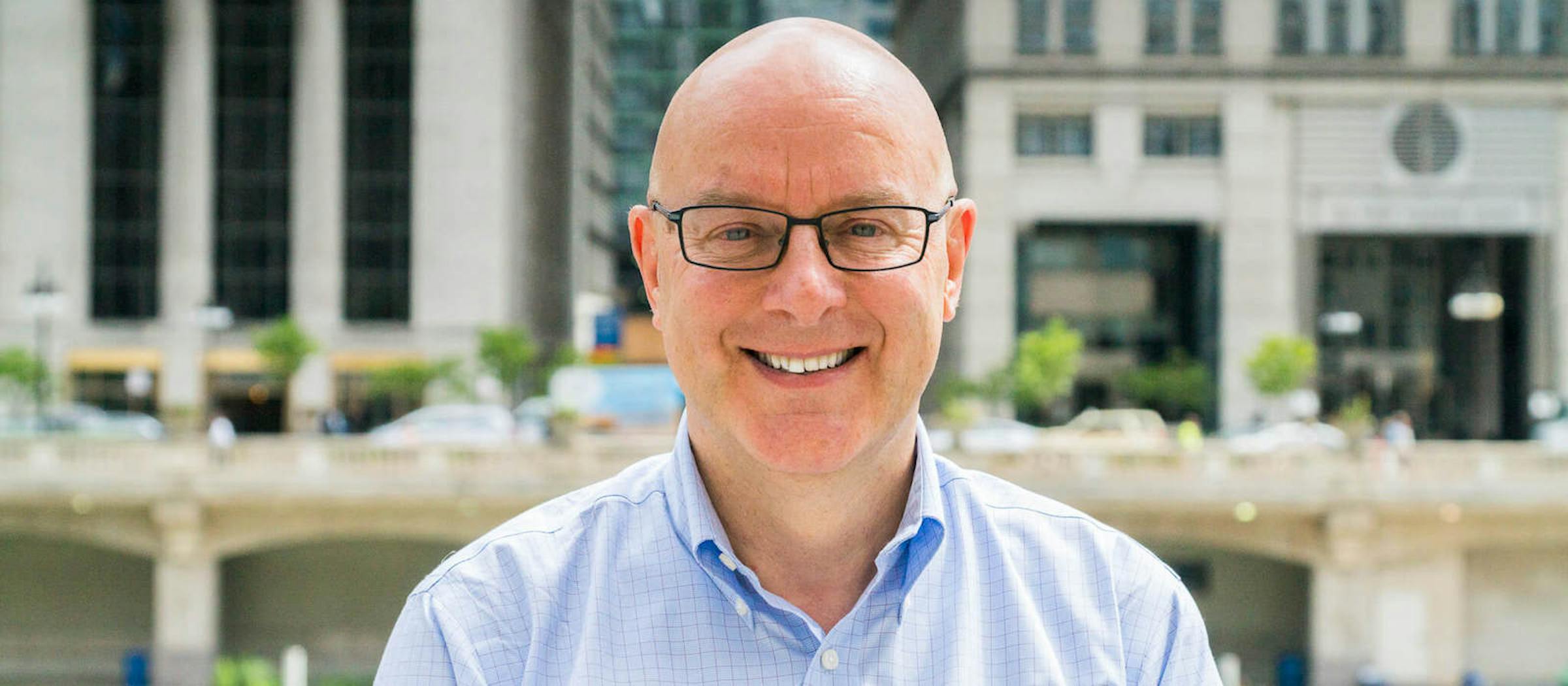Meet Michael Williams, our new venture acceleration director
If you’ve spent time in the MATTER space, you’ve probably rubbed elbows with Michael Williams: A Brit by birth and seasoned healthcare innovator who, most recently, worked as a MATTER startup member. Now, Michael is putting his expertise to work as MATTER’s newest venture acceleration director.
Michael has experienced healthcare from nearly every angle — he’s led innovation in health systems, founded his own company, served as a board member on several startups and worked with investors. His career journey, from Bristol-Myers Squibb to Takeda, has taken him to Paris, Switzerland, Malaysia and all over the U.S.
We caught up with Michael to discuss what drew him to healthcare, his advice for startups and what makes him most excited about his role as venture acceleration director.
How did you end up working in healthcare?
“I’ve been working in life sciences and healthcare since around 1993. I came from a very different industry and would love to say that I planned to be in healthcare but I really just fell into it. It was pure happenstance, but looking back on my life and my career, I actually can’t imagine not doing this now. Wild horses couldn’t drag me away from it, but it was not planned: A friend called me and said they were looking for somebody to work at Bristol-Myers Squibb and my reaction was ‘don’t they sell hair care products?’ because they sold Clairol at the time. It morphed from there.
“It’s been amazing to have the chance to interact directly with patients…When I was out in southeast Asia there had been a very large fire at a disco and I went to see some of the patients who were in the burns unit. I realized very quickly that what we do in healthcare in totality is uniquely personal. Once I made that connection it took on a different meaning for me.”
“I realized very quickly that what we do in healthcare in totality is uniquely personal. Once I made that connection it took on a different meaning for me.”
How do you stay connected to the patient even when you’re working in an office?
“You don’t have to go to a hospital or burns unit to stay connected to the patients in healthcare — we actually interact with patients on a daily basis. I mean every single one of us either has been, are or unfortunately will be, a patient. So in many ways it’s just about paying attention to the people around you, no matter where you are. Then take that one step further and actually just use the opportunity to listen and hear their reality. The amount of information that’s available about the lives we live is really quite staggering, so it’s really just taking the time to get your head above the parapet as it were and listen and soak it in.
“Staying connected is also about reflecting on one’s own personal situation. My mom is 93 years old, and so this discussion that we’re having as a society around aging is something that’s incredibly personal. I’m also getting older by the day and my family has been impacted by Alzheimers over the years. If you just pay attention, the personal connection to healthcare is there every day of the week.”
What drew you to working with startups?
“What I love about startups is every single one is passionate about what they’re doing to the point of obsession — because you have to be obsessive about it. You just do. Often when you talk to them, what they’re solving for is a very personal experience. The key is just being quiet and letting people talk about it and being genuinely connected to it, and that’s certainly something that makes my job very personal on a daily basis.”
What’s the most important piece of advice you share with startups?
“With startups, probably the most difficult things to do is decide what you’re not going to do. People talk about focus with startups and that’s true, they have to focus. But startups, by their very definition, are resource constrained. That resource is money but even more than money it’s time. So one of the first things I’ll often do with startups, before we go down the track of everything they need to get done, is ask them to walk me through their true business imperatives and then tell me what they decided they’re not going to do. Once I’ve done that then we can see what still needs to be resolved. That’s one of the first things every startup needs to think through: What are your business imperatives — which most of them can tell you— and what are you not going to do.”
“That’s one of the first things every startup needs to think through: What are your business imperatives — which most of them can tell you— and what are you not going to do.”
“When startups can’t answer that then the activity level becomes unsustainable because they’re not making choices about what they don’t have the resources to do.”
What are your goals as venture acceleration director at MATTER?
“Chicago and the Midwest should be first amongst equals as a healthcare accelerator and innovation hub…Having lived and worked on the east coast of the U.S. and spent time in various parts of the world, I’ve truly seen that there is absolutely no reason whatsoever that Chicago can’t be first among equals in healthcare. MATTER itself can be the nexus that connects all parts of the innovation acceleration community, both in the U.S. and internationally. Some people might say that’s crazy arrogant and almost unachievable, but I actually don’t think it is. We have world class healthcare systems here, world class universities, world class technology and world class life sciences companies. There’s no reason whatsoever we can’t make that happen, and being a part of that is the big goal.
“On a smaller scale, if I can help a startup access the capabilities that MATTER has — and that includes our partners, our mentors and the investors we work with — so that they can actually realize their dream, however big or small, that would make me smile. Fundamentally that’s why I came. I’m very fortunate to be at this point where those two things are the two things that I think about everyday.”
What’s your advice to startups navigating MATTER or place like it?
“If you don’t talk, we can’t hear. I know that’s hard and I know what it’s like when you’re working through not just volumes of activity but really critical tasks that you’ve got to get done. It’s hard to get up and reach out to someone. But at the end of the day, this is a little bit of a two sided contract in the sense that if a startup doesn’t make their voice heard to MATTER, then we can’t hear and we can’t help.”
“At the end of the day, this is a little bit of a two sided contract in the sense that if a startup doesn’t make their voice heard to MATTER, then we can’t hear and we can’t help.”
“My second advice to MATTER startups is to recognize what we are at MATTER and what we’re not. We are, by intent and design and value, a hub of collaboration. So again that means the best way to work with us is to collaborate — reach out. Not just to us but to other member companies. I know that’s hard, but there’s so much expertise and resources to take advantage of. Yes, there are programs that we run — programs that we continue to shape in a way that responds to what we’ve heard from member companies loud and clear — but at the end of the day, you have to take responsibility as a member of somewhere like MATTER to sticking your hand up in the air and saying ‘I need help.’ Or on the flip side, sticking your hand in the air and saying ‘I’ve resolved A.’
“When I was part of a member startup one of the best programs I attended was a medical device roundtable with a group of CEOs and founders. Within 40 minutes we’d shared answers to three or four critical questions that we all had. Now that was facilitated by MATTER, but it was successful because startup member companies showed up and stuck their hands in the air and asked questions, and other member companies had the answers.”



